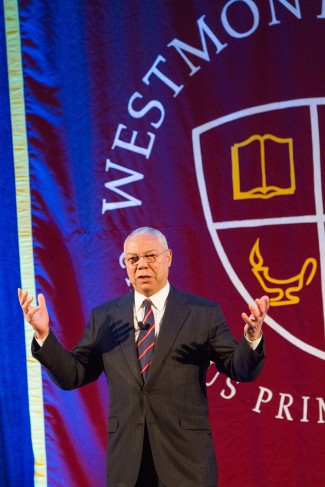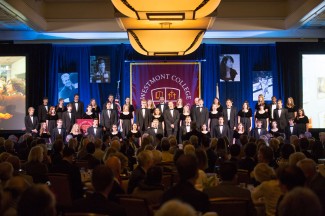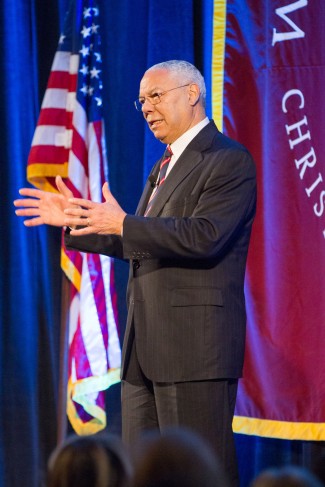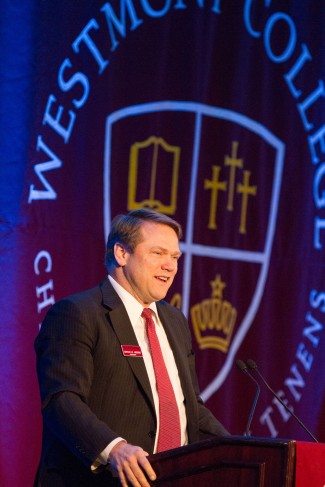Powell Reflects on Leadership at Breakfast
By
Westmont
 Retired Gen. Colin Powell used a combination of poignant stories and humorous anecdotes to keep more than 750 people in rapt attention during the 7 a.m. Westmont President’s Breakfast on March 1 at Fess Parker’s DoubleTree Resort. He dramatically wove stories about camels, squirrels and hotdog vendors around reflections of soldiers at war, lessons of leadership learned from President Ronald Reagan and tales of America’s resiliency.
Retired Gen. Colin Powell used a combination of poignant stories and humorous anecdotes to keep more than 750 people in rapt attention during the 7 a.m. Westmont President’s Breakfast on March 1 at Fess Parker’s DoubleTree Resort. He dramatically wove stories about camels, squirrels and hotdog vendors around reflections of soldiers at war, lessons of leadership learned from President Ronald Reagan and tales of America’s resiliency.
Powell, who had eulogized Gen. Norman Schwarzkopf at the U.S. Military Academy at West Point the day before the breakfast, has fond memories of Santa Barbara when he was Reagan’s national security adviser from 1987-1989.
“Though it was a relaxing time, it’s not as if nothing was going on,” Powell says. “The Soviet Union was collapsing among other things, but the president knew he had to relax and recharge his batteries — and Santa Barbara was the place where we always wanted to come.”
Powell, who was chairman of the Joint Chiefs of Staff for both President George H.W. Bush and for President Bill Clinton from 1989-1993, described Schwarzkopf, who commanded the U.S. -led battle that drove Saddam Hussein’s forces out of Kuwait in 1991, as someone who “believed in this country deeply, he believed in his family totally, he was a warrior who had to send men and women to war, but he loved each and every one and made sure they came back safely.”
Since he retired as secretary of state eight years ago, Powell has traveled around the country to speak at various events. By getting out of Washington and speaking, I’ve learned so much about what we can be,” he says. “Above (all our problems), what I still see are people with nothing, people who believe that together, as a community, we can make this a better place. We always have.”
Reflecting on Westmont President Gayle D. Beebe’s talk about French political thinker Alexis de Tocqueville who wrote “Democracy in America” in 1835, Powell says that “America has a remarkable resilient ability to always come up on top of its problems.”
The day marked the first of the U.S federal budget’s sequestration, a point that was not lost on Powell.
“Even though we have these challenges now, what I see throughout the country are people who have had it with what’s going on in Washington, but at the same time we still believe,” he said. “We still don't look back. We are Americans, and we face challenges like this as one.”
 Powell described President Reagan as a remarkable man, who taught him much about leadership. He told a story from most recent book, “It Worked for Me: Lessons in Leadership and Life,” in which President Reagan ignores Powell who is briefing the president about an internal government conflict that he was overseeing. “Colin, look!” the president replied. “The squirrels just came and got the nuts I put in the Rose Garden this morning.”
Powell described President Reagan as a remarkable man, who taught him much about leadership. He told a story from most recent book, “It Worked for Me: Lessons in Leadership and Life,” in which President Reagan ignores Powell who is briefing the president about an internal government conflict that he was overseeing. “Colin, look!” the president replied. “The squirrels just came and got the nuts I put in the Rose Garden this morning.”
“Then it struck me, and it was something that I knew all along, but he crystallized it for me,” Powell says. “He was saying Colin, I love you and I will sit here as long as you want me to, letting you tell me your problems. You let me know when I have a problem, and then I won’t be looking at the squirrels in the Rose Garden.”
Powell says he also learned to get the best people around you and to then empower them to get the job done, so you won’t have to do it all yourself. “Have a zone of indifference,” he says. “I always get every one of my subordinates knowing what they can do in the zone before coming to me. And when it is my problem, then you come to me. Until then, ‘Go guys, you’re empowered. I trust you. Go get it done.’ And that’s what Reagan was saying. And it worked for him, except on those few occasions when he didn’t have the right people in place.”
 Powell recalled a 1988 meeting with President Reagan about the Japanese buying Rockefeller Center, Pebble Beach Golf Course and other U.S properties. “The cabinet is going nuts, ‘We gotta see the president, something has to be done,’” Powell says. “And they marched into the Oval Office, commerce, trade, everybody and they started beating up the president about the Japanese buying everything. And the president is really focused, he’s not looking at the squirrels or anything. And then when they were all through, waiting for some great direction from the president, Reagan says ‘Well, you know, I’m glad they think America is a good investment.’ Over. Meeting’s over. He said what’s wrong with you guys worrying about trivial stuff. If these folks believe in us, why don’t we believe in us? And that was the end of the conversation.
Powell recalled a 1988 meeting with President Reagan about the Japanese buying Rockefeller Center, Pebble Beach Golf Course and other U.S properties. “The cabinet is going nuts, ‘We gotta see the president, something has to be done,’” Powell says. “And they marched into the Oval Office, commerce, trade, everybody and they started beating up the president about the Japanese buying everything. And the president is really focused, he’s not looking at the squirrels or anything. And then when they were all through, waiting for some great direction from the president, Reagan says ‘Well, you know, I’m glad they think America is a good investment.’ Over. Meeting’s over. He said what’s wrong with you guys worrying about trivial stuff. If these folks believe in us, why don’t we believe in us? And that was the end of the conversation.
“The beauty of Reagan was his ability not to get pulled down into the weeds all the time. Communism is bad. The Soviet Union is bad. Democracy is good. We will prevail. Let’s stay strong and they will collapse. And they did. And he was the one who set the stage for that kind of collapse.”
Filed under
Academics, Campus Events, Campus News, Faculty and Staff, Giving, Lectures, Press Releases, Student Stars